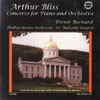Bliss Concerto for Piano and Orchestra
Though hardly cutting edge for its time, Bliss’s concerto is a work of much ingenuity, and Trevor Barnard is a splendid soloist
View record and artist detailsRecord and Artist Details
Composer or Director: Arthur (Drummond) Bliss
Label: Divine Art
Magazine Review Date: 1/2001
Media Format: CD or Download
Media Runtime: 38
Mastering:
ADD
Catalogue Number: 2-4106

Tracks:
| Composition | Artist Credit |
|---|---|
| Concerto for Piano and Orchestra |
Arthur (Drummond) Bliss, Composer
Arthur (Drummond) Bliss, Composer Malcolm Sargent, Conductor Philharmonia Orchestra Trevor Barnard, Piano |
Author: Michael Oliver
Now that it no longer matters (if ever it did) whether Arthur Bliss’s Piano Concerto was an absurd anachronism in 1938, surely we can just sit back and enjoy it for what it is: a virtuoso showpiece with all the trimmings – sweeping romantic melodies, cascades of double octaves, the lot? And yet it is rather more than that. The first movement has three fine themes: a grandly proud one, a smooth lyrical second (as it happens, both quite typical of Bliss) and a memorably beautiful third which you only gradually come to realise is related to both its predecessors. With that sort of ingenuity there’s no risk at all that the first movement, which is rich in texture, incident and interest, will seem a moment too long at 17 minutes. The slow movement is engaging in the way that both its melodies develop in unexpected ways: the first, touching but seemingly brief, is expanded quite differently by the orchestra and the soloist, and the second, which you take for charming light relief, soon becomes grandly pianistic. The finale is no less clever – you may well want to play it again from the beginning, to find out how the brusque, brief figure at the outset becomes so nobly declamatory by the end. The repeat will be no hardship: that finale is a resourcefully handled quasi-rondo, again rich in incident and contrast.
Unfortunately, this fine performance, so well-received when it first appeared, is let down by its dated sound. The solo part is splendidly played (though Sargent could have taken more care over orchestral balance, which is sometimes gawky) but the mono recording is rather dense, a bit veiled at times, with insufficient dynamic contrast. Short measure, too, but the only modern recording, by Philip Fowke (Unicorn-Kanchana, 8/90) adds only a five-minute march, and is only available on cassette. Despite my reservation I enjoyed this reissue enormously.'
Unfortunately, this fine performance, so well-received when it first appeared, is let down by its dated sound. The solo part is splendidly played (though Sargent could have taken more care over orchestral balance, which is sometimes gawky) but the mono recording is rather dense, a bit veiled at times, with insufficient dynamic contrast. Short measure, too, but the only modern recording, by Philip Fowke (Unicorn-Kanchana, 8/90) adds only a five-minute march, and is only available on cassette. Despite my reservation I enjoyed this reissue enormously.'
Discover the world's largest classical music catalogue with Presto Music.

Gramophone Digital Club
- Digital Edition
- Digital Archive
- Reviews Database
- Full website access
From £8.75 / month
Subscribe
Gramophone Full Club
- Print Edition
- Digital Edition
- Digital Archive
- Reviews Database
- Full website access
From £11.00 / month
Subscribe
If you are a library, university or other organisation that would be interested in an institutional subscription to Gramophone please click here for further information.




